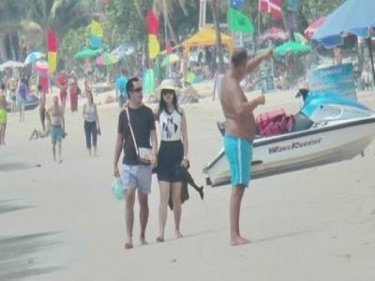The stakeholder survey by the island's Prince of Songkhla University was originally scheduled to be disclosed at a meeting with other interested officials on Thursday.
However, the results of the investigation will now be conveyed to the governor at a private meeting on Friday, Phuketwan has been told.
The future of Phuket's beaches has been debated since sunbeds and most other commerce were cleared from the sands soon after the military took control of Thailand on May 22 last year.
Even sunbeds, beach chairs and umbrellas that sun-loving tourists bring themselves have remained banned.
To placate beach vendors and find a compromise, Governor Nisit Jansomwong created a scheme where 10 percent of all of Phuket's beaches could be used for mats and umbrellas and commercial services.
However, a visit this week by a Phuketwan journalist to Phuket's main beach at Patong showed umbrellas scattered along the beachfront - and jet-skis beached on the sand.
Despite the ban on commercial activities at all Phuket beaches, jet-skis have been given greater space along the Patong beachfront.
The noisy, polluting machines are supposed to be banned from the sand - but it appears that is no longer the case.
Local council municipal authorities - especially in Patong - have said it is beyond their capacity to enforce the governor's suggestion of giving just 10 percent of beaches over to commercial activity.
All commercial activity is supposed to be banned on public beaches - the reason why the military cleared the sands and the foreshores of vendors and illegal restaurants and beach clubs in the first place.
Phuketwan believes the banning of commercial activities on Phuket's beaches is a good idea that gives the island a chance of being seen by tourists as a ''natural'' destination.
But that is not likely to happen if scores of jet-skis are still allowed to operate.
Locals at Patong say the jet-ski operators control the beachfront and do as they please.
Jet-skis, however, have for a long time been banned in Phuket's neighboring provinces of Phang Nga and Krabi, where tourist numbers are increasing.
Meanwhile, without sunbeds, elderly European tourists still complain about being banned from bringing their own beach chairs and umbrellas.
Officials appear to have listened much more carefully to the views of local beach businesspeople, and less carefully to the desires or the tourists - the customers who actually bring the money to Phuket.
Most of the world's best-known beach destinations do not ban tourists from bringing their own equipment.
A decision by Governor Nisit could draw European tourists back to Phuket or turn greater numbers of them away.










First the study was "delayed", possibly because the outcome was not favorable. Now it's being presented privately only to the person who came up with the 10% idea.
Have the opinions of beach users suddenly become a state secret ?
Why not publish the study in public for everyone to read ?
After all, there are not many people on Phuket, residents or visitors, who's lives are not impacted one way or another by what happens on and to the beaches.
Posted by Herbert on August 19, 2015 23:59